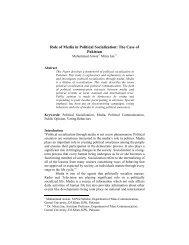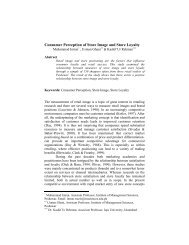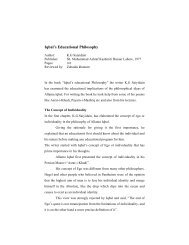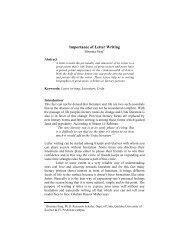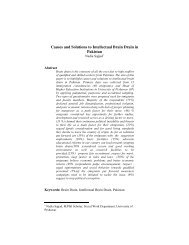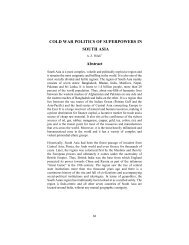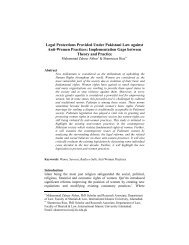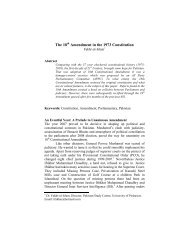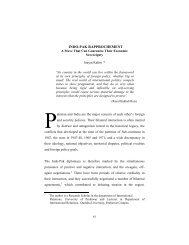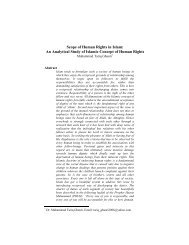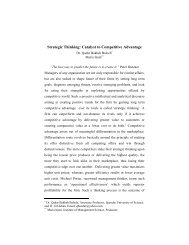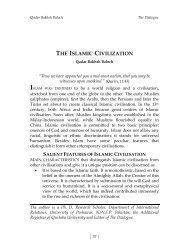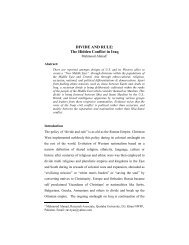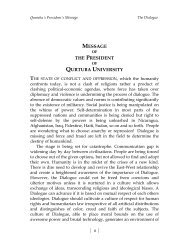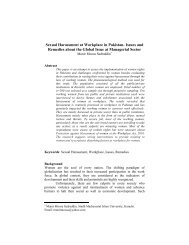Iqbal and Quaid's Vision of Pakistan - Qurtuba University of Science ...
Iqbal and Quaid's Vision of Pakistan - Qurtuba University of Science ...
Iqbal and Quaid's Vision of Pakistan - Qurtuba University of Science ...
You also want an ePaper? Increase the reach of your titles
YUMPU automatically turns print PDFs into web optimized ePapers that Google loves.
<strong>Iqbal</strong> <strong>and</strong> Quaid’s <strong>Vision</strong> <strong>of</strong> <strong>Pakistan</strong> Zamir Akhtar Khan<br />
Notwithst<strong>and</strong>ing the advocacy <strong>of</strong> Indian nationalism on the basis <strong>of</strong><br />
Islam by the leading Ulama, the overwhelming majority <strong>of</strong> the Indian<br />
Muslims adopted the path <strong>of</strong> a separate Muslim nationalism as the only<br />
way leading to their salvation. Less than two years after the death <strong>of</strong><br />
<strong>Iqbal</strong>, All-India Muslim League resolved to struggle for the creation <strong>of</strong><br />
separate Muslim homel<strong>and</strong> on the ideological foundations laid by their<br />
poet-philosopher, Allama Muhammad <strong>Iqbal</strong>.<br />
Raison d'être for a separate state<br />
According to <strong>Iqbal</strong> the raison d'être for creation <strong>of</strong> independent homel<strong>and</strong><br />
is as follows:<br />
“For Islam it will be an opportunity to rid itself <strong>of</strong> the<br />
stamp that Arabian Imperialism was forced to give it, to<br />
mobilize its laws, its education, its culture <strong>and</strong> bring<br />
them into closer contact with its own original spirit <strong>and</strong><br />
with the spirit <strong>of</strong> modern times.” 23<br />
Response <strong>of</strong> masses to <strong>Iqbal</strong>'s thought<br />
<strong>Iqbal</strong> invoked Islamic Concept <strong>of</strong> state which moved the masses. They<br />
rallied around the flag <strong>of</strong> All India Muslim League. Muslim league<br />
turned popular party instead <strong>of</strong> elite class group. The response <strong>of</strong> masses<br />
at grass root was so effective that very soon it was realized by both<br />
Hindus <strong>and</strong> British that division <strong>of</strong> India was inevitable. The Muslims<br />
started their struggle with a single aim to establish an independent<br />
homel<strong>and</strong> wherein they will be able to order their lives in accordance<br />
with the dictates <strong>of</strong> Islam. The most popular slogan which united<br />
majority <strong>of</strong> Muslims was:<br />
“What is the meaning <strong>of</strong> <strong>Pakistan</strong>? It means to establish the Sovereignty<br />
<strong>of</strong> God (& the Vicegerency <strong>of</strong> man) in this world.”<br />
Quaid-the Founder <strong>of</strong> <strong>Pakistan</strong><br />
Muhammad Ali Jinnah was born in 1876 at Karachi. He got his early<br />
education at Karachi from Sind Madrasa tul Islam. Then he moved to<br />
London to pursue his legal education from Lincoln's Inn. After<br />
completing his Bar at Law he returned to Karachi to practice law but<br />
could not establish himself as successful lawyer. Then he went to<br />
Bombay to start his legal pr<strong>of</strong>ession there. He was basically a Statesman<br />
<strong>and</strong> a staunch Indian nationalist <strong>and</strong> an advocate <strong>of</strong> a united India for<br />
many years. At the very beginning <strong>of</strong> his career, even when he was<br />
practicing law full time, he strongly associated himself with the All India<br />
National Congress party <strong>and</strong> quickly became one <strong>of</strong> its brightest young<br />
stars. He was not religious in the popular sense. He had a secular bent <strong>of</strong><br />
The Dialogue 146<br />
Volume V Number 2



